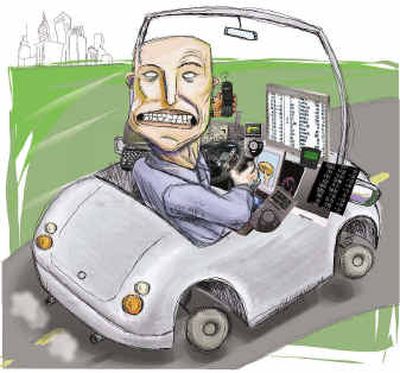Taking the show

It’s time to leave for Grandma’s house, but your kids are still watching cartoons. You can either turn off the television and deal with tantrums or you can be late.
Within a year or two, you could have a third option — download the rest of the show to your vehicle and let your kids watch their shows while traveling.
Over the next several years, car-based entertainment systems are expected to become extensions of home computer networks, able to play movies, music and television shows, engineers said at the 30th annual meeting of the International Congress on Transportational Electronics in Detroit.
“By 2010, we expect there to be 10 million cars equipped with hard (drives),” said Niall Berkery, vice president of product planning for Pioneer Electronics. Today, fewer than 1 million vehicles have hard drives.
One device could change automotive entertainment overnight, according to several engineers. Hard drives would mean being able to store thousands of MP3 songs and hours of video programming in a vehicle.
Audiophiles would be able to store their entire libraries without carrying CDs, and families could store dozens of movies without having to worry about losing or breaking DVDs.
At the conference, Ford showed off a Lincoln Aviator sport utility vehicle with a Delphi-made stereo system that uses a hard drive.
Engineer Craig Simonds said users can create music libraries on their home computers or laptops and download them to their vehicle’s hard drive using either a wireless home network or an Internet hot spot.
If downloading to vehicle hard drives becomes popular, Simonds said service companies likely will offer download packages of news and fresh music.
“This goes beyond just entertainment,” Simonds said. “We have text-to-speech software available now, so you could download your e-mail to your car radio and play it as an audio file.”
Kumar Ramaswamy, an engineer for consumer electronics company Thomson Inc., said a system like the one being shown by Ford also could be used for video content.
People with TiVo systems or other digital video recorders could download shows from their homes to their cars using wireless networks or removable hard drives that could plug into both a TiVo system and the vehicle.
These are not far-off, car-of-the-future ideas, Ramaswamy said. Most of the technology is already in place.
The major limitations are wireless access to move files and the fragility of some hard drives. Electronic systems in cars must be able to survive hotter and colder temperatures than some computer systems. Rugged hard drives that can handle such extremes tend to be more expensive.
The average car-based DVD system costs about $1,400, Berkery said. Adding hard drives and wireless modems could drive that price higher.